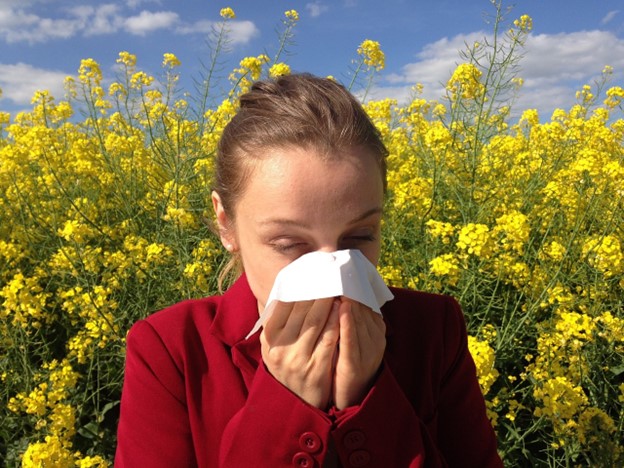Seasonal Allergies Are Nothing to Sneeze At

WASHINGTON — After a long winter of bare trees and gray days, the first signs of renewal are upon us. While it’s beautiful to see flowers bud, leaves appear and grass begin to grow, for many people, it means allergy season.
Seasonal allergies, or allergic rhinitis, affect more than 400 million people worldwide and bring symptoms that can be mildly annoying to potentially dangerous. We will explain what happens in your body when you have an allergy, common causes and symptoms in the spring and tips to manage the sniffly season.
How Do Allergies Work?
An allergy occurs when your body perceives a foreign substance (that may be harmless) as a threat. It is an “exaggerated response” from your immune system. When your body perceives a threat, your immune system releases an immunoglobulin E antibody. These antibodies then increase histamines, leading to an allergic reaction.
An allergic reaction can affect your sinuses, skin, or digestive system. It can be minor or life-threatening. Serious allergic reactions can result from insect venom and certain foods. Others may result from pet dander, mold, dust, cigarette smoke, or seasonal environmental factors.
There are two phases of an allergic reaction. The first occurs within minutes of exposure (think of a food allergy or bee sting) and the second can happen four to eight hours later. The difficulty with seasonal allergies is that the exposure can last several months. Let’s break it down further.
Common Spring Allergies
Spring seasonal allergies — or allergic rhinitis or hay fever — typically affect the nose. Rhinitis means inflammation of the nose. They may cause sneezing and an itchy, runny, stuffy nose. Allergic rhinitis may also cause watery, itchy, red, or swollen eyes, called conjunctivitis. It can lead to post-nasal drip and itchiness in the throat.
Seasonal allergic rhinitis is a reaction to pollen from trees, grass and weeds. Interestingly, hay fever isn’t about hay.
According to the American College of Allergy, Asthma & Immunology, seasonal allergies are determined by tree pollination. In the United States, this begins in February and lasts until early summer. The area you live in and the climate may affect the dates. Here are some time frames to look out for.
- Tree Pollen Allergy: Late February through early June.
- Grass Allergy: April through June.
- Ragweed: For some people, it doesn’t end in the spring. Ragweed causes fall allergies that may last from August through November.
In tropical climates, seasonal allergies may last year-round. Higher temperatures and moisture, like a warm rainy spring, can extend spring allergies until the fall.
According to the Asthma and Allergy Foundation of America, in 2021, 81 million people (67 million adults and 14 million children) in the United States were diagnosed with seasonal allergic rhinitis, a number that increases every year.
Research shows that people in urban areas are more likely to be affected by allergic rhinitis than people in rural areas. Although rural areas seem to have more trees and grass, pollution in urban areas can exacerbate a pollen allergy. Climate change has also prolonged the pollen season over the past 30 years. More people have seasonal allergies that last longer.
Tips for Managing Seasonal Allergies
If you experience the following symptoms from late February through early summer, you may suffer from allergic rhinitis:
- Itchy nose, throat and eyes.
- Stuffy, congested and runny nose.
- Sneezing.
- Mucus in the throat.
The first step is to see an allergist. They can perform a skin test to tell you precisely what you’re allergic to, which could go beyond the seasonal culprits of pollen, trees, grass and ragweed. Once you consult your medical provider, here are some tips from the ACAAI and AAFA.
- Track Pollen Counts: If you know you are allergic to pollen, you can track pollen levels in your area each day. When they’re particularly high, you may want to avoid going outside.
- Use the National Allergy Bureau to pinpoint your location and pollen levels.
- Use the Environmental Protection Agency’s air quality tracker.
- You can also check a weather or allergy tracking app.
- Use the National Allergy Bureau to pinpoint your location and pollen levels.
- Use the Environmental Protection Agency’s air quality tracker.
- You can also check a weather or allergy tracking app.
- Time of Day: Tree and grass pollen levels are highest in the evening during the spring and early summer. Ragweed levels are highest in the mornings for fall allergies.
- Keep Your Home Clear: In the spring, keep your windows shut in your home and car. If possible, use an air conditioner or air filter.
- Protect Yourself Outside: Wear sunglasses and a hat to protect your face from pollen in the spring. Wear a mask to protect your nose and mouth further.
- Shower and Change Clothes: Shower, wash your hair and change your clothes when you come inside to keep your home free of pollen.
- Prescription Medication: Your allergist may suggest immunotherapy, including allergy shots, inhalers, or other prescribed medication.
- Over-the-Counter Medication: Your allergist may also suggest OTC remedies, such as eye drops, nasal sprays, antihistamines and decongestants. Some allergists recommend taking your OTC medication daily throughout the season to prevent symptoms.
- Stay Hydrated: Drinking plenty of water may help clear congestion. Water can also help you stay hydrated if you take a medication that dries out mucus.
Need a Tissue?
Springtime is a double-edged sword for millions of people. The flowers, trees and grass are refreshing to see after the winter, but they can irritate your sinuses, causing discomfort that disrupts your life. Always see a doctor for personalized advice.
You can reach us at [email protected] and follow us on Facebook and X (formerly known as Twitter)
























